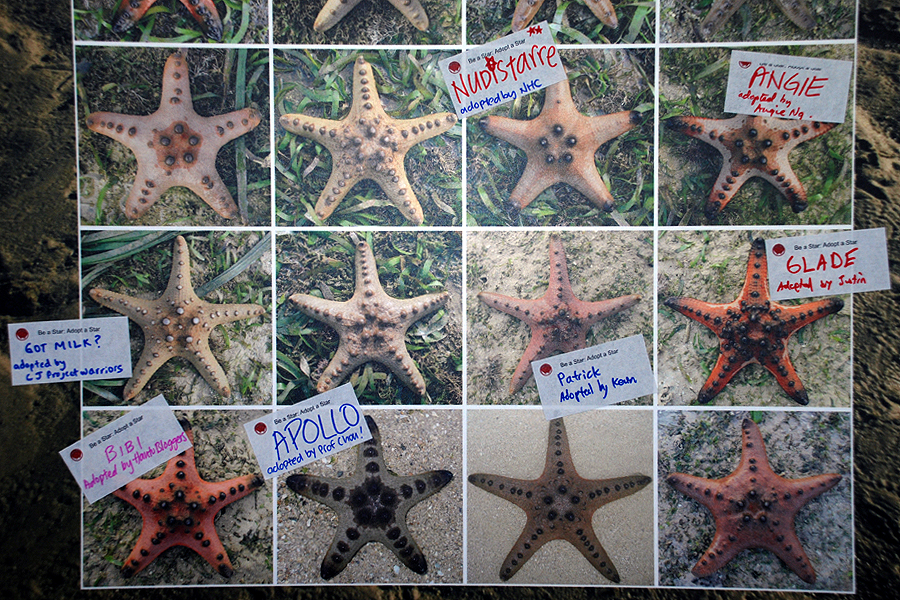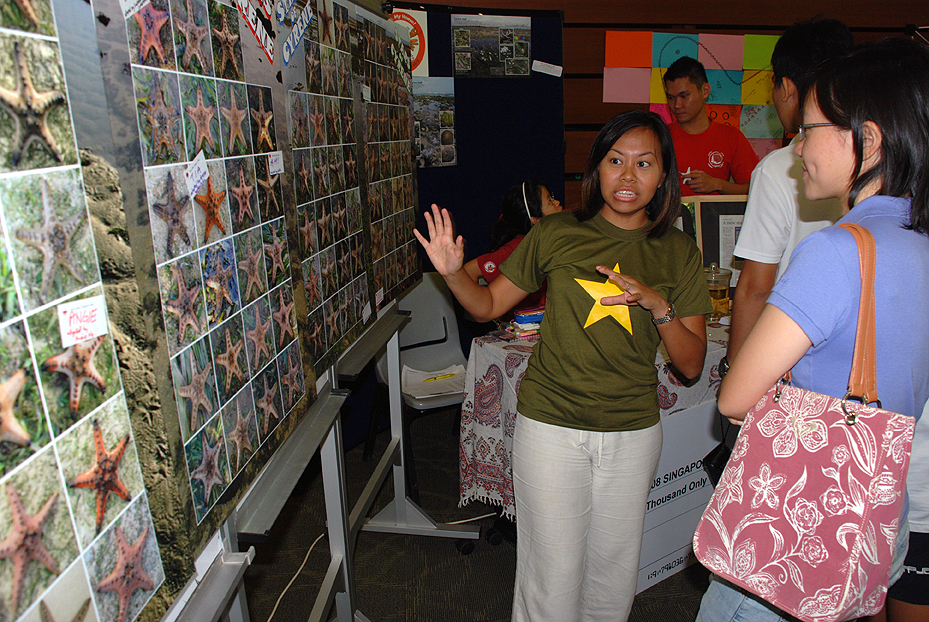Star Trackers were featured in the newspaper, My Paper on 11 August 2008. Thank you Koh Soo May for the interview.
MyPaper, 11 August 2008, Page 34.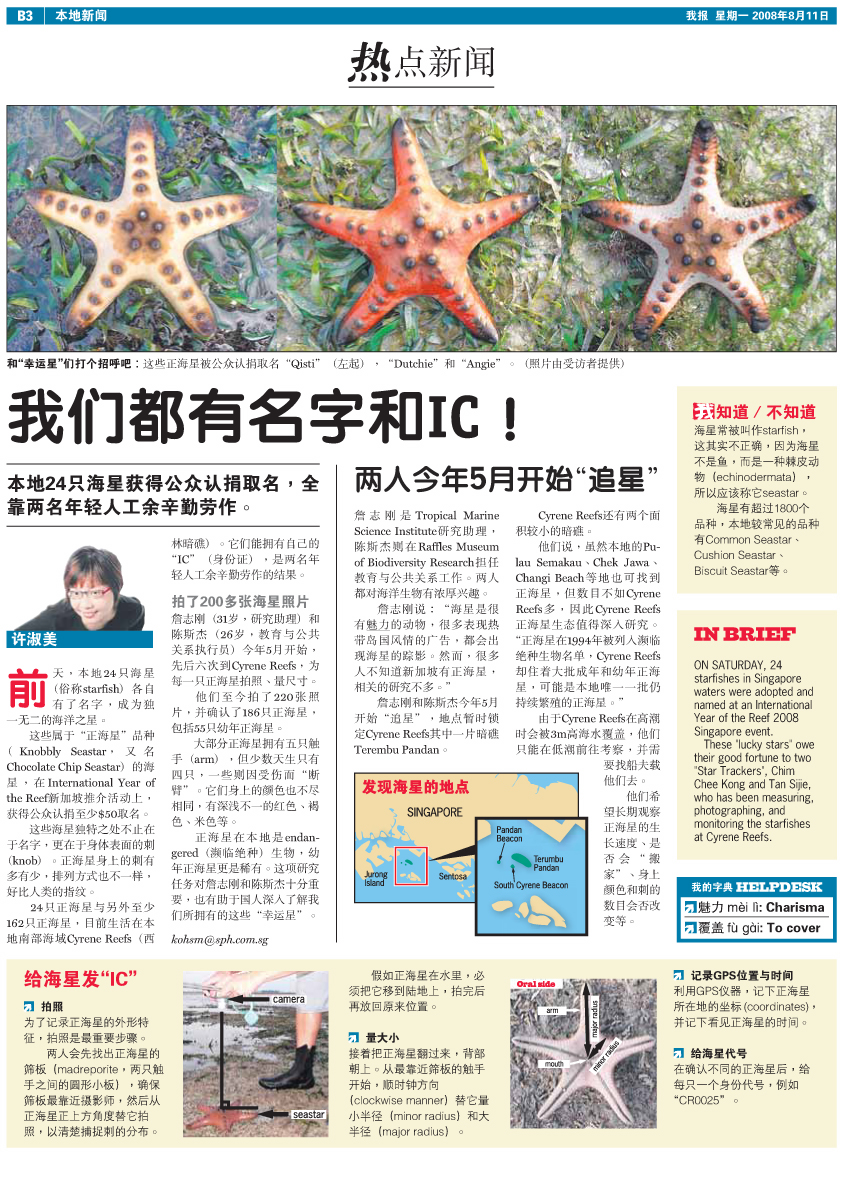
Translation:We all have a name and IC!Two days ago, 24 local seastars were each given a name, becoming unique stars in the ocean.These seastars, belong to a species commonly as the "Knobbly Seastar" as well as the "Chocolate Chip Seastar", were adopted by the public for a minimum sum of $50 donation at the International Year of the Reef event.These seastars are not only unique in name but are also unique in the number and arrangement of knobs on the body surface.Twenty-four knobbly seastars and at least 162 other individuals currently inhabit a local southern reef known as Cyrene Reefs. They can have their own "IC" (Identification Card) due to the hard work of two young men.Since May this year, Chim Chee Kong (31 years old, research assistant) and Tan Sijie (26 years old, education and public relations officer) have visited Cyrene Reefs six times, took photographs and measurements for each seastar.They have taken 220 photographs, of which 186 were recognised as individuals, including 55 juveniles.Most of the seastars have five arms, although a few have only four arms, some of which were due to injury. In addition, the body may be of different colours, which consist of different shades of red, brown, beige etc.The Knobbly Seastar is a locally endangered animal and the juveniles of this species are rare. This research project is extremely important to Chim Chee Kong and Tan Sijie, as it helps Singaporeans to better understand that we have these "lucky stars".Two people started "Star Chasing" in May this yearChim Chee Kong is a research assistant with the Tropical Marine Science Institute and Tan Sijie is a education and public relations officer with the Raffles Museum of Biodiversity Research. Both have strong interests in marine life.Chim Chee Kong said "Seastars are charismatic animals, as demonstrated by their presence in many advertisements that promote the tropical island feel. Nonetheless, many do not know that Singapore has seastars, and related research are also few."Chim Chee Kong and Tan Sijie started "star chasing" in May this year at Terembu Pandan, which is one of the reef of Cyrene Reefs.Cyrene Reefs have two other smaller reefs.They said that even though the Knobbly Seastar is also found at local sites such as Pulau Semakau, Chek Jawa and Changi Beach, the number of individuals are not as many as in Cyrene Reefs, and that is the reason why the ecology of the Knobbly Seastar population at Cyrene Reefs is worth investigating. "Although the Knobbly Seastar was classified as endangered in 1994, Cyrene Reefs is inhabitated by a large number of adults as well as juveniles, and is possibly the only sustainable population that remains locally.
Because Cyrene Reefs is submerged by 3m of water during high tides, they can only survey during low tides, with the help of boatmen.
They hope to have a long-term study on individuals regarding their growth rates, movements, ontogenetic change in morphology etc.
MyPaper, 11 August 2008, Page 35.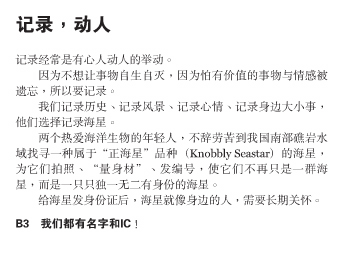
Translation:
Recording, Touching
Recording is often the touching action of people who cares.
Because of the hope not to let things die out by themselves, because of the fear that precious things and feelings be forgotten, thus the need for recording.
We record histories, sceneries, feelings, and daily things that happen around us, they chose to record seastars.
Two young men with a passion for marine life, tirelessly went to our country's southern reef in search of a species of seastar (Knobbly Seastar), took photographs and measurements of each seastar they encounter, provide each with an identification code, such that they are no longer just a population of seastars but are unique individuals.
MyPaper, 11 August 2008, Page 36.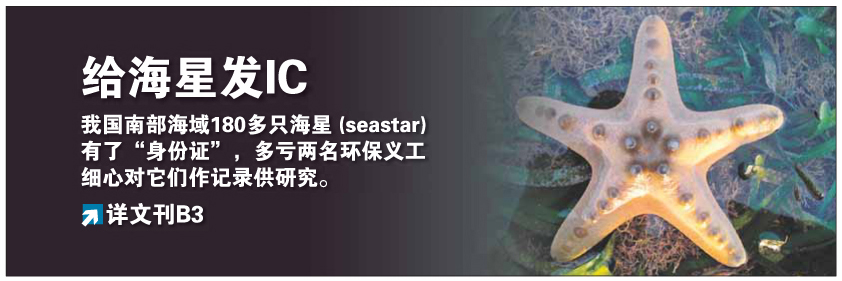
All images were downloaded from mypaper.sg, Singapore Press Holdings.








